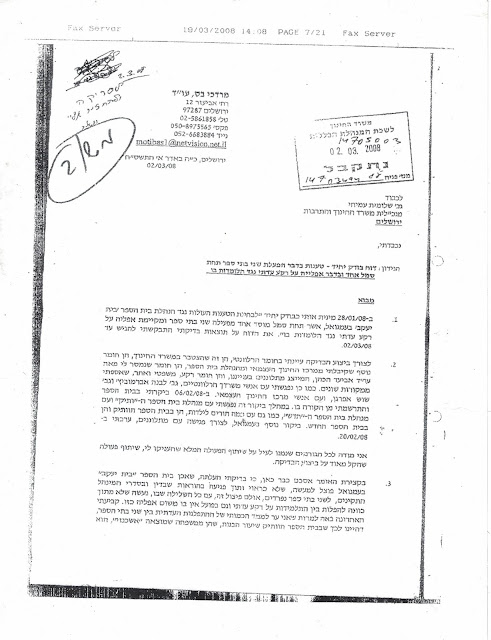Patient-centered care, or business? first English, then Hebrew
עברית אחרי:
ספרות הסיעוד משקפת את חשיבות הטיפול הממוקד במטופל. פרקטיקה מבוססת ראיות פירושה שאחיות צריכות לאסוף ראיות מתחום עבודתן כדי להעריך את המדיניות והנהלים, תוך הצבת המטופל במרכז המשוואה של מה שמתאים להן.
בישראל, חתימה על הצהרת בריאות שונה במשקלה המשפטי מחתימה על הסכם משכנתא, למשל. אם החותם על הסכם המשכנתא טוען שלא ידע על מה הוא חותם, אין לכך משקל, אך אם מטופל חותם על טופס הסכמה רפואית ולאחר מכן טוען שלא הבין על מה הוא חותם, המטופל יכול לטעון לפעולה פסולה מצד עובד הבריאות.
מאז שנת 2016 בערך, נאמר לאחיות בתי ספר בישראל כי הצהרת הבריאות שעליה חותמים ההורים, המכילה סעיף הנוגע לחיסונים, מהווה אישור מספיק לחסן את הילד.
ניתן להעלות כמה שאלות חשיבה ביקורתית בנוגע להצהרת הבריאות:
1 - לאחר שמונה שנים של יישום המדיניות לפיה חתימה על טופס זה מספיקה כדי לאפשר חיסונים, מה ראו אחיות בית הספר בשטח?
2 - האם ההורים מבינים שטופס זה הוא הסכם לחיסונים?
3 - האם אחיות רשאיות להתקשר להורים כדי להעריך את רצונותיהם האמיתיים בנוגע למתן חיסונים? כלומר, האם הן מסתירות מהאחיות שהן מתקשרות להורים כדי להבטיח את רצונם?
4 - האם אחיות מרגישות בנוח לחסן ילדים רק באמצעות הצהרת הבריאות?
5 - כיצד הגיבו הורים כשגילו שילדם קיבל חיסון שלא התכוונו אליו, כלומר, לא ציפו שהצהרת הבריאות משמעותה הסכמה מלאה?
6 - מה דעתן של האחיות על תגובת ההורים? כיצד מדיניות זו משתלבת עם ערך בניית האמון בין איש מקצוע בתחום הבריאות למטופל, ואכן, האם בניית אמון היא ערך חשוב, המוחזק על ידי האחיות וההנהלה?
7 - לגבי אחיות שהודיעו על כך (שחתימה על הצהרת הבריאות משמעה הסכמה) בערבי הורים, במיילים ובאפליקציות - האם הן מגלות שהורים עדיין לא מבינים את המדיניות הזו?
8 - כמה סתירות קיימות בין ההסכמה בהצהרת הבריאות לבין פנייה של הורים לאחות או למורה, ביום החיסון או בסביבתו, כדי לסרב למתן חיסון? ייקח אולי יום של כמה אחיות שסורקות את רישומי החיסונים ומציינות את הסתירות - לא מחקר ענק.
9 - עם כל הסתירות הפוטנציאליות הללו, כפי שצוין לעיל בסעיף 8, האם לא ראוי לשנות את המדיניות הזו?
10 - עד כמה הם מרגישים חופשיים לדבר על זה?
אלו יהיו שאלות פרואקטיביות, מונעות ומבוססות ראיות, אשר ישפרו את מה שמכונה בסיעוד "פרקטיקה מומלצת".
בישראל, אחיות אינן צריכות לקחת שיעורי המשך כדי לשמור על רישיון האחיות שלהן, כפי שהן צריכות בארה"ב.
ישראל נוטה להיות חברה תגובתית ולא פרואקטיבית ומונעת. קריאות חירום מדי שעה להאזנה לעדכוני חדשות ברדיו גורמים לאנשים לשמוע מצב חירום מתמיד, תגובתיות מטפחת ולא מניעה.
לפיכך, אנרגיית האוכלוסייה מתרוקנת ומופנית מחדש, אנשים מוסחים מתהיות, נניח מה קרה לאחיות בית הספר בשני העשורים האחרונים.
עברנו מלהיות שייכות לבתי ספר ולהיות נוכחות אמינה שם, לאחיות על גלגלים, שמגיעות לבית ספר כדי לבצע חיסונים ובדיקות גדילה. ביקורי רופא בכיתות א' ו-ז' בוטלו, בדיקות הגדילה הצטמצמו מכל שנתיים לביצוע רק בכיתות א' ו-ז'. עברנו מלהיות אחראיות על, נניח, שני בתי ספר, לתשעה בתי ספר, ולפי הספירה האחרונה שלי - אחות אחת לכל 16 בתי ספר.
היו " תחלואות" בישראל בזמנים שונים - אף אחת מהן לא התרחשה בעמנואל. בתקופתי כאחות בית הספר ובתקופת האחות שלפניי, לא היו התפרצויות. אחות בית הספר הקודמת ואני היינו מדברות עם השכנים שלנו באופן אישי, מעודדות מתן חיסונים, מזכירות לאנשים לומר בחנות או בבר מצווה, "אני מקיימת יום חיסונים בעוד שבוע, אנא הביאי את בנך". התרגשתי מכך שהאחות הקודמת מבית הספר עשתה לי כך אחרי עלייתי לפני 25 שנה, עברתי אותה ברחוב והיא עצרה אותי - "בתך צריכה את החיסון השני שלה נגד הפטיטיס A" - היא דאגה לצורכי האוכלוסייה וגם אני. גם התעמתתי עם תושבת מקומית מספר פעמים ואמרתי שהיא באמת חייבת לקחת את בתה להערכה אצל אנדוקרינולוג בגלל גובהה - האם לבסוף התערבה והודתה לי.
שוב, ב-30 השנים האחרונות, בעמנואל, מקום מגוריי, לא היו התפרצויות של מחלות זיהומיות המכוסות על ידי חיסונים (אני לא כולל קורונה ואני לא יודע את הסטטיסטיקה לכך).
ייתכן שזה קשור לנוכחות ידועה, מכובדת, קבועה ומסורה בקהילה.
בחזרה לנטייה לתגובתיות ולא למניעה בחברה הישראלית: כיצד תגובתיות, במקום מניעה ופרקטיקה מבוססת ראיות, משפיעה על החברה היא שאלה גדולה נוספת.
אנחנו לא יכולים פשוט לכבות שריפות, אנחנו לא יכולים להיות גלגל שיניים שעושה כמיטב יכולתו במערכת גדולה יותר, שיכולה להשתפר בכל הנוגע לתמיכה במטופלים.
הבנתי משהו, קצת חלש מדי וקצת מאוחר מדי: אם אתה מכניס את האצבע שלך לסדק בקיר כדי למנוע הצפה, אז אתה מרוקן את המשאבים האישיים שלך ולא מתקן את הבעיה מהשורש שלה.
אם אחות הקהילה או בית הספר שלך מקשיבה לך, שמה אותך במקום הראשון, ייתכן שהיא מסוכסכת עם ההנהלה שלה.
אם לאיש המקצוע בתחום הבריאות שלך אין תמיכה ניהולית כשהיא דוגלת בך ומבלה איתך זמן, היא מתרוקנת לאט לאט במובנים רבים.
הלחץ של להיות במחלוקת עם ההנהלה, של הבחירה במצפונך על פני ציות לכללים מעשה ידי אדם, בעלי מוטיבציה כלכלית, והתעלמות מרצונות פטנטים, גובה מחיר.
אתה לא גיבור אם אתה דוחה את עצמך נגד שיטפון, אתה חייב לתקן את הבעיה מהשורש שלה.
הבנתי את זה קצת חלש מדי וקצת מאוחר מדי.
אידיאליזם של אדם לא יכול להתנגד למכונה.


Comments
Post a Comment